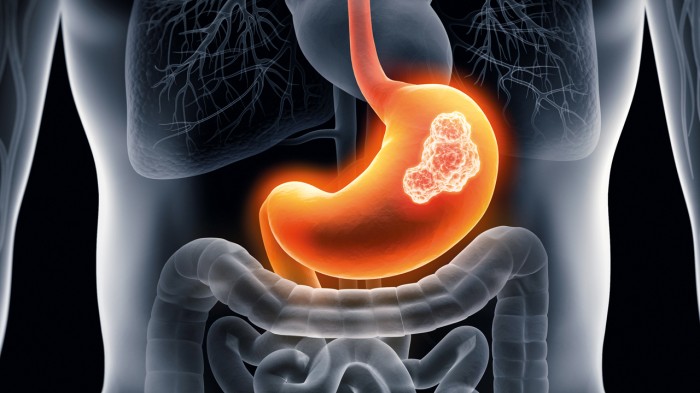In Clinical
Let’s get clinical. Follow the links below to find out more about the latest clinical insight in community pharmacy.Bookmark
Against the backdrop of festive overindulgence, pharmacy teams face the increased challenge of distinguishing common complaints such as indigestion and heartburn from signs and symptoms suggestive of more serious gastrointestinal disorders. By being aware of and alert for the major gastrointestinal red flags, pharmacy teams can help spot potential early warning signs of cancer while simultaneously helping customers with their everyday OTC indigestion management.
Learning objectives
After reading this learning update feature you should be able to:
- Recognise the characteristic signs and symptoms of oesophageal, stomach, small bowel and pancreatic cancer
- Identify risk factors that increase the likelihood of developing GI cancers
- Provide information to customers on recognising red flag symptoms of cancer and when to consult their GP.
Key facts
- Although usually mild and self-limiting, everyday symptoms of overindulgence – notably heartburn and indigestion – can sometimes be early signs of cancer
- Any customer suffering with heartburn or acid reflux that persists for three weeks or more should be encouraged to consult their GP
- Pharmacy has an important role to play in recognising red flag symptoms of potential GI cancers, particularly in patients with known risk factors
Oesophageal cancer
Oesophageal cancer is the fourteenth most common cancer in the UK, with around 25 new cases diagnosed every day.1 The most common symptom is difficulty swallowing (dysphagia). Customers may complain of a painful or burning sensation when swallowing or describe the sensation of food 'sticking' in their throat or chest.
Heartburn as a symptom is strongly associated with the adenocarcinoma subtype of oesophageal cancer that most frequently affects middle aged, Caucasian and overweight males with a history of smoking or alcohol overuse.2
According to the charity Heartburn Cancer UK, heartburn affects one in 10 adults on a daily basis and up to two in 10 weekly. Of these, a further one in 10 will have Barrett's oesophagus, the only known precursor for adenocarcinoma. The risk of progression to cancer in this population is around one in every 1,000 patients per year.2
Any customer suffering with heartburn on most days for a period of three weeks or longer should be encouraged to see their GP, even if OTC medication is helping to relieve symptoms.
Other potential signs and symptoms of oesophageal cancer to be aware of include unintentional weight loss, pain in the throat or behind the breastbone, coughing or hoarseness, food regurgitation and dark faeces (caused by oesophageal bleeding). According to Cancer Research UK, approximately 60 per cent of oesophageal cancers in the UK are preventable – compared to only 38 per cent of other cancers.1,2
Stomach cancer
Stomach cancer is a relatively rare malignancy in the UK, accounting for 2 per cent of all cancer cases, and most commonly affects the elderly.1 Around half of all cases are diagnosed in those aged 75 years or older.1
As with other GI cancers, common symptoms include dysphagia, persistent indigestion, heartburn or acid reflux, nausea or vomiting (especially after eating) and feeling full after consuming only small amounts of food. Other clinical signs that may be associated with potential stomach cancer include weight loss, a lump or pain in the stomach and tiredness due to anaemia.
Around 40 per cent of all stomach cancers are caused by H. pylori infection, which is also a key cause of peptic ulcer.1 According to Cancer Research UK, there is also some evidence to suggest that diet may interact with H. pylori in the stomach to increase the risk of cancer development.
H. pylori can be detected with simple blood, stool or breath tests and is easily eradicated by a simple course of antibiotics.
Other risk factors for stomach cancer include male gender, smoking, being overweight or obese, and excess alcohol consumption. Exposure to certain chemicals can also increase the risk of developing stomach cancer, particularly for those individuals who have worked in the rubber production industry.
Recent evidence from observational studies suggests that long-term use of proton pump inhibitors (PPIs) may be associated with a doubling in the risk of gastric cancer.3
Opinion remains split on the causality of the effect of PPIs on cancer risk and this has yet to be confirmed in randomised, controlled, clinical trials.3 However, it is important to bear this in mind regarding any customers on chronic PPIs who may present with potential stomach cancer symptoms, particularly those with a history of H. pylori infection.
Any customer complaining of digestive symptoms that do not improve or worsen after two weeks, with or without OTC intervention, should be encouraged to consult their GP. Specific red flag symptoms that warrant immediate referral include problems swallowing, palpable lumps in the stomach and significant unintended weight loss over the last six to 12 months.
Small bowel cancer
Compared to the much more common and high profile bowel cancer affecting the large bowel, small bowel cancer remains relatively rare and affects only around 1,700 people in the UK each year – equivalent to less than 1 per cent of all new cancer cases.1
As with many of the malignancies that affect the GI tract, detecting small bowel cancer is complicated by the often vague symptoms and significant overlap with benign but common conditions – most notably irritable bowel disease.
Even if small bowel cancer is suspected, it can be difficult to diagnose clinically as its location in the central part of the digestive tract makes it difficult to examine physically and it can prove tricky to obtain clear images on x-ray or CT scans.
Key symptoms of small bowel malignancy include pain or a lump in the abdomen, weight loss, nausea/vomiting, diarrhoea, fatigue, dark faeces caused by bleeding in the small bowel, a bowel blockage and anaemia.
As with all potential malignancies, these symptoms create more cause for concern if a customer also has one or more of the recognised risk factors for small bowel cancer. These include older age and a diet rich in red meat, smoked foods or high in fat.
Certain chronic GI conditions can also increase the risk of developing small bowel cancer – most notably Crohn’s disease, which is linked to a raised risk of adenocarcinomas of the ileum, and coeliac disease, which slightly increases the likelihood of both adenocarcinoma and lymphoma types of small bowel cancer.
Certain genetic inherited conditions also increase the risk of small bowel cancers; these include familial adenomatous polyposis, Lynch syndrome and Peutz Jegher’s syndrome.
Pancreatic cancer
Pancreatic cancer currently ranks as the deadliest common cancer in the UK, with around 80 per cent of patients already at an advanced stage of disease by the time diagnosis is made.4 The vague presentation of the disease means it often goes undetected and symptoms may not appear until the cancer is at an advanced stage.
Despite the importance of timely diagnosis, a recent survey by Pancreatic Cancer UK revealed nearly a third of people in the UK would wait three months or more to seek help from their GP if they had potential symptoms.
"The pandemic is actively deterring people from contacting their doctor, with 31 per cent saying they would delay seeking help for longer than usual," says Pancreatic Cancer UK. "Of those less likely to seek help, half (51 per cent) did not want to be a burden to the NHS, while a quarter (25 per cent) were worried about catching Covid-19."4
The four most common symptoms of pancreatic cancer are back pain, indigestion, abdominal pain and weight loss.4 Any customer with these symptoms for four weeks or more should be encouraged to consult their GP.
Around 70 per cent of patients ultimately diagnosed with pancreatic cancer first seek medical attention for pain.1 This can begin in the stomach and spread to the back, and tends to be worse on lying down or after meals, and better on sitting forward.
In some patients, the pain presents as constant back pain in the centre of the back. Weight loss of 10 per cent or more for no apparent reason is always a cause for concern and is a potential symptom of pancreatic, as well as numerous other cancers.
Jaundice is one of the most notable red flag symptoms of pancreatic cancer and requires immediate medical attention. It can cause yellowing of the skin and whites of the eyes, darker urine and lighter coloured bowel movements. Other potential but less common signs of pancreatic cancer include diabetes, skin itching, sickness, bowel changes, fever and shivering, and blood clots.
"Pancreatic cancer has not gone away because of Covid and I would urge anyone with persistent, unexplained symptoms to use the NHS," says Diana Jupp from Pancreatic Cancer UK.4
References
Sponsored
 Sponsored education
Sponsored education
Managing fever in children
Get to grips with the current guidance on managing fever in children and how antipyretics can help, and discover products you can recommend.
 Sponsored education
Sponsored education
A different approach to pain
Complete this interactive video to rethink your pain recommendations and ensure you offer every customer the most appropriate advice


Record my learning outcomes